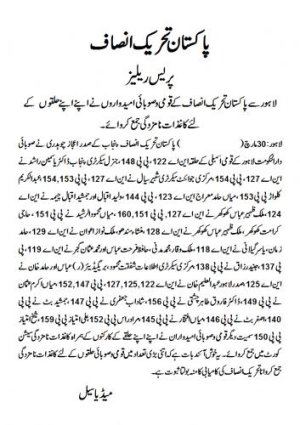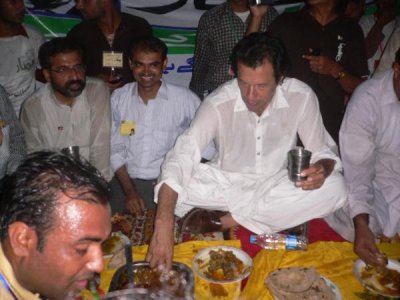A clean sweep
In its 65-year history, Pakistan has accomplished a number of remarkable achievements and, at the same time, suffered from as many – if not more – painful failures. The one lesson the entire nation seems to have collectively learnt is that the rise and fall of our country’s fortunes is directly linked to the quality and competence of the political leadership of the time. It takes decades for a nation to work out a system where only the best and brightest ascend to power and steer the destiny of the nation in one direction or another.
Countries that are heavyweights in the balance of power today realised long ago that a strong and prosperous future lay in ensuring that the reins of political power and leadership be handed down consistently to the brightest, most honest, and competent citizens. With time they also realised that the chances of finding the best increases when access to political power is available to all, rather than being the domain of a privileged few.
Thus, an African American – a minority in his country – raised by a single parent from the American middle class is, today, the president of the United States. A hydraulic engineer from a poor family with a small tea trading business is currently the president of China, while the son of a social worker and an ear, nose, and throat doctor is the president of France.
The son of an ironworker, grocer, barber, and blacksmith who also taught the Quran; himself a PhD in transportation engineering and planning, is currently the president of Iran. The president of Turkey is a PhD in Economics and the son of a retired air force mechanic, while the prime minister of the same country, as a teenager, used to sell lemonade and sesame buns on the streets of Istanbul to earn extra money.
In Pakistan, until the Pakistan Tehreek-e-Insaf’s recent intraparty elections, politics was solely the domain of a small group of wealthy political elite. Well aware that the only qualification they had for retaining political authority was their wealth, this ruling elite left no stone unturned in looting and plundering this country. Momentary respite would arrive in the form of ‘well-meaning’ military dictators, each of whom would try their own unique formulae for the country’s prosperity with mixed short-term results.
Thus, until the PTI’s intraparty elections, there was no room for ordinary Pakistanis in politics. While the downtrodden have been suppressed to an extent that they are incapable of even dreaming of having access to power in this country, honest, capable and hardworking Pakistanis, lucky to be born into some privilege, lack the requisite dishonesty required for politics in Pakistan regardless of their academic and career achievements.
However, all of this has changed after Imran Khan, through the PTI’s intraparty elections, grabbed Pakistani politics by the horns and steered it in a direction it has never treaded before in the last 65 years. And, as a result, on January 30th, Humayun Chacha, a tailor by profession and a daily-wage earner, was elected district president of PTI Kohat.
Waheed Murad, a poor peasant farmer, beat a powerful businessman and landlord to become the PTI’s Attock district president. In Rawalpindi, a son of a retired army officer and a graduate from Imperial College London, who also captained the college’s prestigious cricket team was elected PTI union council vice-president. Rehan Khan, a painter and a daily wager, looking after his 103-year-old father was elected the PTI district president in Abbottabad.
Imagine the effect of results such as these on the people of this country at the grass roots. Family members, relatives and neighbours of tailors, rickshaw drivers, daily wagers, gatekeepers and peasants are for the first time associating titles such as ‘president’, ‘vice-president’ and ‘joint-secretary’ with someone they know.
The victory of ordinary people over the rich and mighty in these party elections have captured the imagination of the masses and shattered the mental and physical barriers put up by rulers. For the first time in their lives, ordinary people voted for other ordinary people and saw them win. The power of their vote has finally sunk in.
In terms of preparation for the upcoming general elections, the PTI’s intra-party elections already handed the party a clear lead over the opposition. And all this even before the official party election campaign had started.
The party elections were based on Nadra’s voter-registration system and there was thus a rush to get people’s ID cards made and votes registered, leaving the vast majority of the PTI’s members prepared to cast their votes for the PTI in the upcoming general elections.
Billboards, advertising materials all advertised the PTI’s name and colours, with Imran’s face on them. And all this took place all across the country including Fata and Balochistan, well ahead of any signs of any election campaign by other parties in the country.
Therefore, next time Imran speaks of a clean sweep, do not dismiss it as an idealistic, political and motivational slogan. Rather understand the deep impact the PTI’s intra-party elections have had on all segments of the Pakistani society. The PTI has already swept the imagination of the masses; the clean sweep is only a general election away.
The writer is a member of the PTI.Email:
zirgham@gmail.comTweets: @znafridis
http://www.thenews.com.pk/Todays-News-9-168245-A-clean-sweep
















